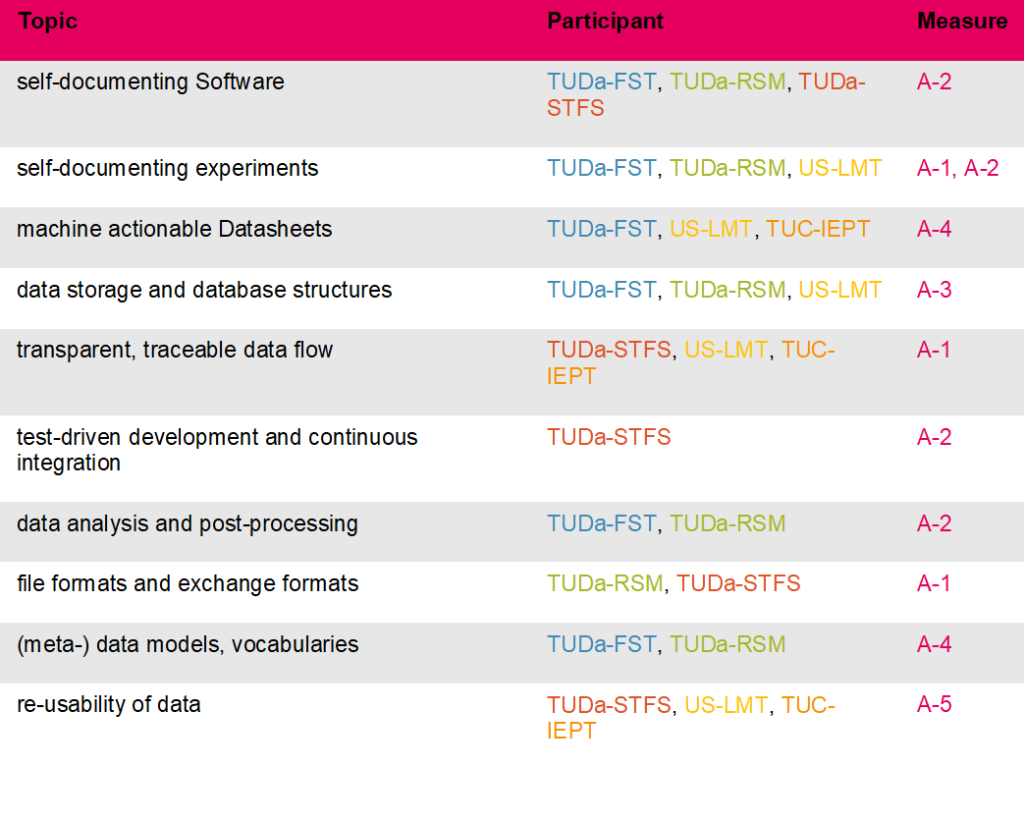introducing the archetype Alex
“Hello, I’m Alex. I’m an engineer that develops and carries out bespoke, one-of-a-kind experiment(s) to investigate a technical system in regard to its process variables. The experiment may be real or virtual, using a custom tailored hardware or software system. Examples of such technical systems are process plants, buildings, prototypes, components, control loops, mechatronic systems, algorithms, mass transport, interaction interfaces, etc.
I use individual combinations of software, apparatus, methods, and interfaces that vary from case to case. Flexibility is particularly important to me, which makes it all the more important that I can trace the configuration and data flow in my experiments at any time. I am solely responsible for my experiments and need to know exactly what my system is doing. My professional background may be based in production enginering, constructive mechanical engineering, thermofluids, energy systems, systems engineering or construction engineering.”

key challenges & objectives
Because Alex pursues highly specialised, bleeding edge research objectives, she has to leverage individual, bespoke one-of-a-kind-setups of equipment, methods and interfaces. Since she typically is solely responsible for a project, Alex wants to know exactly how her system and experiment function. She also commonly needs to adapt the system and experiment to meet her research objective. Alex needs highly flexible software or data models to represent and connect her experiment components, configurations and results. Therefore, Alex often rightfully chooses an iterative or agile approach to reach her research objective. Alex’s need for flexibility has to be balanced with the necessities of compatibility and reusability. She must be able to trace the data-flow and configuration of her experiment, as well as adapt and repeat it. Alex mostly has to deal with at least a medium volume of data, with no upper limit (gigabytes to terabytes per year and project or more). Therefore Alex’s data rates are in almost all cases too high to manage the generated data manually, even when using document management or version control systems. Additionally, the amount of data is often too large to store or archive the entirety of a generated dataset.
The major objectives of this Task Area are to support Engineers like Alex and provide means to:
- facilitate re-use and integration of partial solutions (e.g. unified data transfer, increased compatibility, reusability) to improve the traceability of system functions, data flow and configuration. Lower the barrier to manipulate and adapt experiment setups.
- enable modular, self-documenting software setups (including representations of hardware setups), that automatically generate machine actionable metadata
- to store and retrieve specific subsets of (meta-)data in medium to large sized collections in an intuitive and performant way to encourage publishing and re-using data collections and facilitate the decoupling of code and data.
measures
Pursuing the objectives above, the Chair of Fluid Systems at TU Darmstadt (TUDa-FST) works together with four participant institutions at TU Darmstadt, TU Clausthal and Saarland University on the following five measures of the task area Alex:
- Means for integration and synchronization of bespoke system functionality implementations: A-1 “Transmitting data between bespoke partial solutions“
- Means and background knowledge to design system functionalities modular, interoperable and reusable: A-2 “Modular approach to reusable bespoke solutions”
- A storage solution that combines performant storage of the primary data (transmitted data, cf. A-2) and flexible storage of complex metadata (cf. A-2): A-3 “Persistent storage of medium to high data volumes with fine grained access”
- An intuitive and unified basis to interact with data and metadata centred around software modules and hardware as well as transmitted data: A-4 “Core metadata model”
- Means and background knowledge to reconstruct incomplete metadata by using information from textual sources: A-5 “Retroactive metadata generation for legacy data”
The table to the right shows how the five institutions have structured these measures into topics of interest for engineers like Alex and the distribution of work across the institutions.
results
During the initialisation phase of the task area, the vision, overarching concepts and contents have been refined. Concrete use-cases as well as specific topics and contributions corresponding to the measures have been identified. The focus in this early phase has been on the research, assessment and validation of state of the art technologies and methods applicable for the pursued use-cases and their contributions to the needs of engineers like Alex.
contact information
The Task Area is lead by:
NFDI4Ing Co-Spokesperson Prof. Dr.-Ing. Peter F. Pelz
Peter.Pelz@fst.tu-darmstadt.de
The contacts at the participating research institutions are:
Prof. Dr. habil. Andreas Dreizler
dreizler@rsm.tu-darmstadt.de
Prof. Dr.-Ing. Christian Hasse
hasse@stfs.tu-darmstadt.de
Prof. Dr. Andreas Schütze
schuetze@lmt.uni-saarland.de
Prof. Dr. rer. nat. Wolfgang Schade
wolfgang.schade@tu-clausthal.de
Members of the Alex-Team are:
Michaela Leštáková
michaela.lestakova@fst.tu-darmstadt.de
Kevin Logan
kevin.logan@fst.tu-darmstadt.de
Jan Lemmer
jan.lemmer@fst.tu-darmstadt.de
Nils Preuß
nils.preuss@fst.tu-darmstadt.de
Dr. rer. nat. Steven Wagner
wagner@rsm.tu-darmstadt.de
Dr. Arne Scholtissek
scholtissek@stfs.tu-darmstadt.de
Christopher Schnur
c.schnur@lmt.uni-saarland.de
Henrik Lensch
h.lensch@lmt.uni-saarland.de
Ludmila Eisner
ludmila.eisner@tu-clausthal.de

